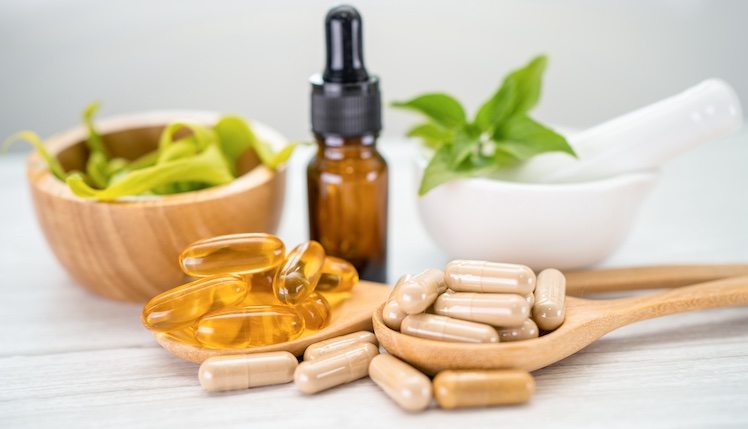
Natural supplements and lifestyle changes can significantly improve your sleep.
If you struggle to fall and stay asleep, you're not alone. Did you know that over 30 percent of people report experiencing insomnia-like symptoms that get in the way of falling asleep?[1]
Sleep is so critical for your physical and mental health, and it can be frustrating to feel like you're not getting enough high-quality sleep to reap the important benefits. Luckily, there are a number of natural remedies and lifestyle changes you can try to improve the quality and quantity of your sleep. Learn more about these natural remedies for sleep and get ready for a better night's sleep.
5 Natural Remedies to Help You Sleep
Adding supplements into your diet—or eating more foods rich in the active ingredient—can be a great way to naturally help your body get better sleep. If you have questions about incorporating these supplements into your routine, or if you're pregnant or nursing, make sure to talk to your primary care provider first.
1. Melatonin
Melatonin is the hormone that your body produces, telling your brain that it's time to sleep.[2] Melatonin levels rise and fall with your body's circadian rhythm, rising in the evening and lowering in the morning.
Taking a melatonin supplement is one of the most effective natural remedies to improve sleep. Some studies have shown that melatonin helps people fall asleep faster and stay asleep longer.[3] [4] It's especially helpful for night shift workers who need to sleep during the daytime when natural melatonin production is low, or for travelers combating jet lag.
2. Magnesium
Magnesium supplements have a variety of health benefits. Magnesium is a mineral that's important for brain and heart health, in addition to helping sleep quality.[5] Magnesium can help relax muscles, induce sleep, and regulate melatonin production. Magnesium is also critical for attention, focus, and mental alertness. Magnesium deficiency can lead to health problems like difficulty sleeping, constipation, and anxiety.
Some studies have shown that magnesium supplements can improve the quality and quantity of sleep.[6] You can also eat foods rich in magnesium rather than taking a supplement.[7] Legumes, seeds, dark leafy greens, nuts, and whole grains all have high levels of magnesium.
3. Valerian root.
Valerian is a tall, flowering grassland plant native to Asia and Europe. When the roots are carefully processed—typically dried, then made into a tea, capsule, or tablet—and consumed, some studies have shown that they can help reduce the amount of time it takes to fall asleep and help you sleep better.[8] That's because valerian root has a few chemical compounds that act together to help your sleep.
4. Lavender
Lavender's gentle fragrance can soothe the body and mind and prepare you for a better night of sleep. Some studies suggest that lavender aromatherapy can help improve sleep quality and improve sleep disturbance symptoms.[9] [10] To use lavender as a natural remedy, try spritzing lavender essential oil onto your pillow as a mist, adding a few drops to an essential oil diffuser, or massaging a few drops into your temples before bed.
5. Glycine
Glycine is an amino acid that can help you fall asleep faster and improve the quality of your sleep. Studies evaluating the effectiveness of glycine as a supplement found that participants fell asleep faster and woke up feeling less fatigued and more lively, peppy, and clear-headed.[11] [12]
Supplemental glycine can be taken in pill or powder form. To help reap the same health benefits, you can also eat foods that are rich in the nutrient, like bone broth, kale, spinach, bananas, and kiwis.
Lifestyle Changes that Can Help You Sleep at Night
In addition to natural supplements, you can improve your sleep quality through natural lifestyle changes that support a good night's sleep. Here are some lifestyle changes to help you get to sleep—and stay asleep—each night:
- Sunlight exposure. Circadian rhythm is the 24-hour clockthat helps regulate our sleep patterns as well as our appetite, digestion, hormones, and temperature.[13] When it comes to sleep, our circadian rhythm mirrors the light and darkness outside. By increasing your sunlight exposure shortly after waking up, you'll feel more alert in the morning and your body will naturally start to feel sleepy and fall asleep in the evening.[14]
- Regular meditation. Research has shown that meditation can help improve sleep quality.[15] Making it a relaxing pre-bed ritual can also help prime your body to fall asleep faster. (Try meditating with lavender aromatherapy for an even more relaxing experience that can improve your sleep.)
- Consistent exercise. Some studies show that exercise can help improve the quality and duration of sleep.[16] A regular, consistent exercise routine can yield a positive impact on the quality and quantity of your sleep.
- Reduced consumption of alcohol and caffeine. If you want to improve your sleep quality, one of the easiest lifestyle changes is to reduce the amount of caffeine or alcohol you consume, especially close to bedtime. Caffeine is a stimulant, which keeps the body alert and awake, while alcohol disrupts the body's natural sleep cycle and reduces the quality of sleep. Caffeine stays in the system for a very long time, so researchers recommend avoiding caffeine for at least six hours before bed.[17]
Using the right natural remedies and lifestyle changes can make a big difference in improving your sleep. If you still experience ongoing issues getting enough uninterrupted sleep each night, make sure to check with a medical professional. Taking steps to improve your sleep is a worthy investment—for your health, comfort, and long-term well-being. Getting back to a consistently good night's sleep will help you wake up refreshed, energized, and ready to keep living a healthy, fulfilling lifestyle.
References:
[1] https://www.ncbi.nlm.nih.gov/pmc/articles/PMC1978319/
[2] https://www.ncbi.nlm.nih.gov/pmc/articles/PMC6057895/
[3] https://pubmed.ncbi.nlm.nih.gov/28648359/
[4] https://pubmed.ncbi.nlm.nih.gov/33417003/
[5] https://www.ncbi.nlm.nih.gov/pmc/articles/PMC6212970/
[6] https://www.ncbi.nlm.nih.gov/pmc/articles/PMC8053283/
[7] https://my.clevelandclinic.org/health/articles/15650-magnesium-rich-food
[8] https://www.ncbi.nlm.nih.gov/pmc/articles/PMC4394901/
[9] https://www.ncbi.nlm.nih.gov/pmc/articles/PMC4505755/
[10] https://www.ncbi.nlm.nih.gov/pmc/articles/PMC5376423/
[11] https://onlinelibrary.wiley.com/doi/full/10.1111/j.1479-8425.2007.00262.x
[12] https://onlinelibrary.wiley.com/doi/abs/10.1111/j.1479-8425.2006.00193.x
[13] https://www.nigms.nih.gov/education/fact-sheets/Pages/circadian-rhythms.aspx
[14] https://www.cdc.gov/niosh/emres/longhourstraining/light.html
[15] https://www.ncbi.nlm.nih.gov/pmc/articles/PMC6557693/
[16] https://www.sciencedirect.com/science/article/abs/pii/S1087079200901102